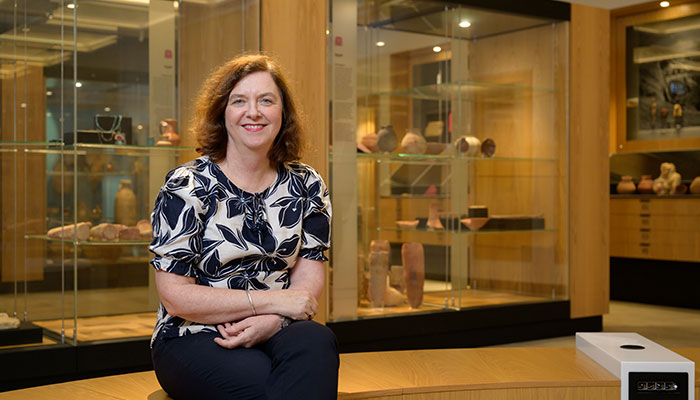Teacher: Dr Alison Holland, pictured, is an Associate Professor at the Department of History and Archaeology and Director of Research Training. She teaches a first-year unit on the history of modernity from the late eighteenth century, as well as human rights history.

Groundwork: Alison holds a Bachelor’s degree from Sydney University, a Diploma in Museum Studies and a PhD from University of NSW.
How Alison’s graduate students describe their department supervisors: Supportive, dedicated, reliable, wise, generous, patient, inspiring and encouraging.
What Alison says:
At the Department of History and Archaeology we research and teach archaeological, linguistic and textual studies of a range of cultures. We cover the ancient world to modern society; from ancient Egypt and the New East to Greece and Rome and from the archaic period to late antiquity and Byzantium, Medieval and Renaissance history to Modern Europe, and Australian and World History.
Our department has a student-centred approach to supervision. We have developed a wonderful community of practice where graduate researchers and Early Career Researchers (ECRs) are invited to share in the research culture of the department. The latter includes activities and support connected to our wonderful History Museum and the Centres for Ancient Cultural Heritage and Environment, Applied History and Australian Centre for Egyptology. A small committee of Higher Degree Researchers (HDRs) also run a wonderful showcase of HDR and ECR research via an annual conference with paper presentations, workshops and seminars including sessions on life beyond graduate research. They are also physically located close to the academics in our new Arts precinct which makes for a dynamic space. We have a great supportive framework for the Masters and PhD candidates throughout their candidature.
I am really proud of the achievements made by our Higher Degree Research students.
Over the past four years we have had 135 completions of the Master of Research (MRes) and Doctor of Philosophy (PhD). Seven of our MRes candidates have received a University medal upon graduating and six of our PhDs have received a Vice Chancellor commendation. Outstanding students also regularly receive departmental awards as well as prestigious fellowships and scholarships abroad. They have won prizes in the Faculty Three-Minute Thesis (3MT) competition with some going on to represent the Faculty at the University level competition.
What I love most about teaching is the dynamism of the teaching and learning environment. I love the inquiry and knowledge transfer that takes place in the classroom and I love it when students express surprise and curiosity about history and ideas.
I would like my students to view me as … knowledgeable, enthusiastic, kind, empathetic and engaging.
Students are facing a tsunami of issues at this moment in time. The cost of university degrees, particularly in Arts, the high cost of living, housing affordability and accessibility, and mental health issues related to all of these things. Our teachers support students by communicating awareness of these factors and conditions, by providing advice about ways of accessing assistance and support on campus, by providing extra supports in the classroom and online in terms of workload and assessments, and by providing space for consultations. The PhD and Masters students also have a student representative on the Faculty research training committee. We also encourage students to think about aligning their research to industry and offer assistance in terms of internships and, with the Graduate Research Academy (GRA) professional development.
One piece of advice I always give my students is … Ask yourself: what am I trying to say - what is the point - and how can I say it with clarity?
There’s no such thing as the perfect student. Indeed, one of the challenges and rewards of Higher Degree Research is that there is no formula with either the students or their teachers and supervisors. Students are wonderful, they are what makes this institution, along with their diverse talents, interests, curiosity and thirst for knowledge. Supervision is a reciprocal relationship that requires respect, appreciation of each other’s roles, effective communication, commitment, engagement and understanding.



